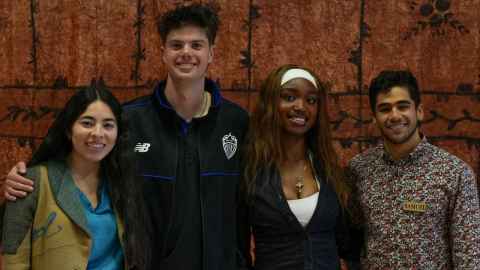Stanford students shape sustainability in Auckland
4 September 2025
Several Auckland organisations have had their environmental sustainability boosted by interns from Stanford Doerr School of Sustainability.

Sustainability practices at three Auckland organisations have been given fresh impetus, thanks to interns from Stanford Doerr School of Sustainability.
Over the past three months, four students from Stanford University in California, USA, have been using their knowledge to create environmental change at Vector, Auckland Council and Auckland Football Club.
Professor Jacqueline Beggs, director of the University of Auckland’s Centre for Climate, Biodiversity and Society, Ngā Ara Whetū, helped organise the internships.
Ngā Ara Whetū supported the students in learning about environmental issues in New Zealand and te ao Māori.
“This has been a remarkable collaboration.
“It has given the students an invaluable insight into Aotearoa’s sustainability challenges,” says Beggs.
Stanford student Kaitlyn Sanchez worked with Auckland Council as a climate intern, using global models to inform the city’s climate change plan.
Sanchez recommended Auckland embed sustainability into all its economic initiatives, rather than treating them as separate issues.
“The economy and environment are intrinsically linked. Doing this research made me realise just how much the two overlap,” she says.
Samuel Desai and Sarah Oyegoke have just finished internships at Vector.
Desai looked at global electricity markets to find models that might help Vector transition to more sustainable forms of electricity generation.
Oyegoke’s research aimed to help Vector prepare for new Electricity Authority rules requiring power retailers with a market share of 5 percent or more to offer time of use pricing by June 2026.
“I recommend time of use plans, because they can be beneficial for customers,” Oyegoke says.
As an intern at Auckland FC, Reilly McKnight focused on making training sessions and match days more sustainable.
Transport made up a huge part of the club’s greenhouse gas emissions, so he suggested supporting sustainable aviation fuel and carbon offsetting.
McKnight helped bring public transport into the cost of match tickets, allowing the club to significantly reduce the number of fans travelling to matches in private vehicles.
As many as 82 percent of fans used private vehicles when there were no trains, but 43 percent used trains when they were offered within the ticket price, he says.
Installing water coolers has helped reduce the use of plastic water bottles, while reusable metal cups could replace single-use plastic for fans buying drinks in the future, McKnight says.
Solar panels and electric vehicle charging stations are also being introduced at some Auckland stadiums to increase sustainability.
The paid internships in Auckland were spearheaded by Stanford Dean Arun Majumdar and prominent US-based New Zealanders Tim Brown, a former professional footballer and co-founder of sustainable footwear company Allbirds, and Anthony Mosse, investment director for New Zealand Trade and Enterprise in North America.
Beggs hopes this year’s internship programme is the first of many to come.
“It gives me hope we might just change the trajectory of where the world is heading,” she says.
Media contact
Rose Davis | Research communications adviser
M: 027 568 2715
E: rose.davis@auckland.ac.nz